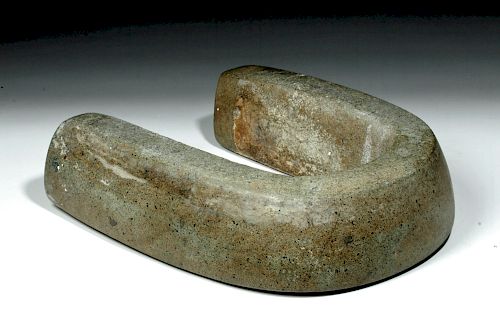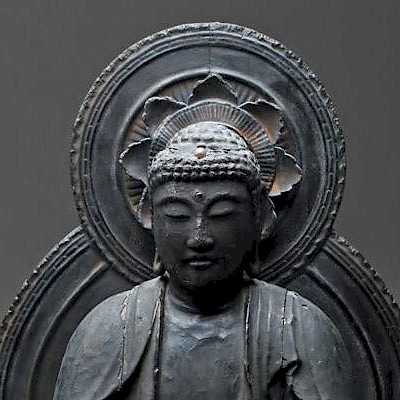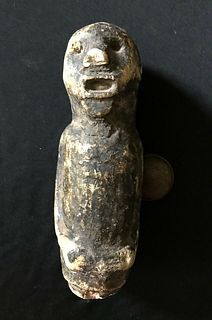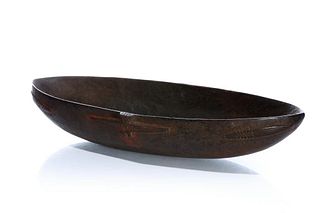Veracruz Stone Yoke - For Ballgame
Lot 287
About Seller
Artemis Fine Arts
686 S Taylor Ave, Ste 106
Louisville, CO 80027
United States
Selling antiquities, ancient and ethnographic art online since 1993, Artemis Gallery specializes in Classical Antiquities (Egyptian, Greek, Roman, Near Eastern), Asian, Pre-Columbian, African / Tribal / Oceanographic art. Our extensive inventory includes pottery, stone, metal, wood, glass and textil...Read more
Estimate:
$4,300 - $6,450
Absentee vs Live bid
Two ways to bid:
- Leave a max absentee bid and the platform will bid on your behalf up to your maximum bid during the live auction.
- Bid live during the auction and your bids will be submitted real-time to the auctioneer.
Bid Increments
| Price | Bid Increment |
|---|---|
| $0 | $25 |
| $300 | $50 |
| $1,000 | $100 |
| $2,000 | $250 |
| $5,000 | $500 |
| $10,000 | $1,000 |
| $20,000 | $2,500 |
| $50,000 | $5,000 |
| $100,000 | $10,000 |
| $200,000 | $20,000 |
About Auction
By Artemis Fine Arts
Jan 7, 2020
Set Reminder
2020-01-07 10:00:00
2020-01-07 10:00:00
America/New_York
Bidsquare
Bidsquare : VARIETY AUCTION - Antiquities / Ethnographic
https://www.bidsquare.com/auctions/artemis-gallery/variety-auction---antiquities-ethnographic-4787
Around the world & back in time - be amazed at the treasures you will find. Antiquities from Egypt, Greece, Italy and the Near East, Asian, Pre-Columbian, African / Tribal / Oceanic, Native American, Spanish Colonial, Russian Icons, Fine Art, much more! Artemis Fine Arts info@artemisfinearts.com
Around the world & back in time - be amazed at the treasures you will find. Antiquities from Egypt, Greece, Italy and the Near East, Asian, Pre-Columbian, African / Tribal / Oceanic, Native American, Spanish Colonial, Russian Icons, Fine Art, much more! Artemis Fine Arts info@artemisfinearts.com
- Lot Description
**Originally Listed At $3000**
Pre-Columbian, Mexico, Veracruz culture, ca. 6th to 8th century CE. An undecorated, sanded grey-green stone yoke from the Mesoamerican ballgame. A defining characteristic of the Veracruz culture was the ballgame, sponsored by elites, who owned stone yokes like this one. The greenstone came from the Guatemalan highlands, and it would have been transported at enormous cost - imagine how difficult it was to move the boulders they were carved from! Yokes like these ended their useful lives buried with nobles and we know of them today from elite graves. Size: 15" L x 11.25" W x 4.4" H (38.1 cm x 28.6 cm x 11.2 cm)
The Mesoamerican ballgame was a ritual event, not just for entertainment (although it would have been that too!), and Veracruz was where it seems to have been most popular. Veracruz has the highest density of ballcourts of any Mesoamerican civilization, with even the smallest towns having a dedicated court, a rectangular area lined with sloping walls where spectators could sit. Stone yokes were not actually used to play the game, but instead for ritual processions where the elite sponsors of the game wore them to demonstrate their wealth - a little like seeing the owners of your local team out on the field after a championship win or on Opening Day. This yoke and others like it are stone representations of the leather and wicker belts worn by the ballgame players to protect themselves from the large, heavy rubber ball. None of those real belts have survived to the present day, so all we have to visualize them are early Spanish accounts and these stone representations.
Provenance: private Harrisburg, Pennsylvania, USA collection acquired before 1995
All items legal to buy/sell under U.S. Statute covering cultural patrimony Code 2600, CHAPTER 14, and are guaranteed to be as described or your money back.
A Certificate of Authenticity will accompany all winning bids.
We ship worldwide and handle all shipping in-house for your convenience.
#124765Some light surface scoring and patina from age and handling.Condition
- Shipping Info
-
All shipping is handled in-house for your convenience. Your invoice from Artemis Gallery will include shipping calculation instructions. If in doubt, please inquire BEFORE bidding for estimated shipping costs for individual items.
-
- Buyer's Premium



 EUR
EUR CAD
CAD AUD
AUD GBP
GBP MXN
MXN HKD
HKD CNY
CNY MYR
MYR SEK
SEK SGD
SGD CHF
CHF THB
THB












